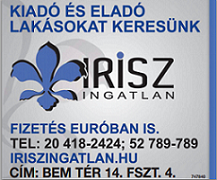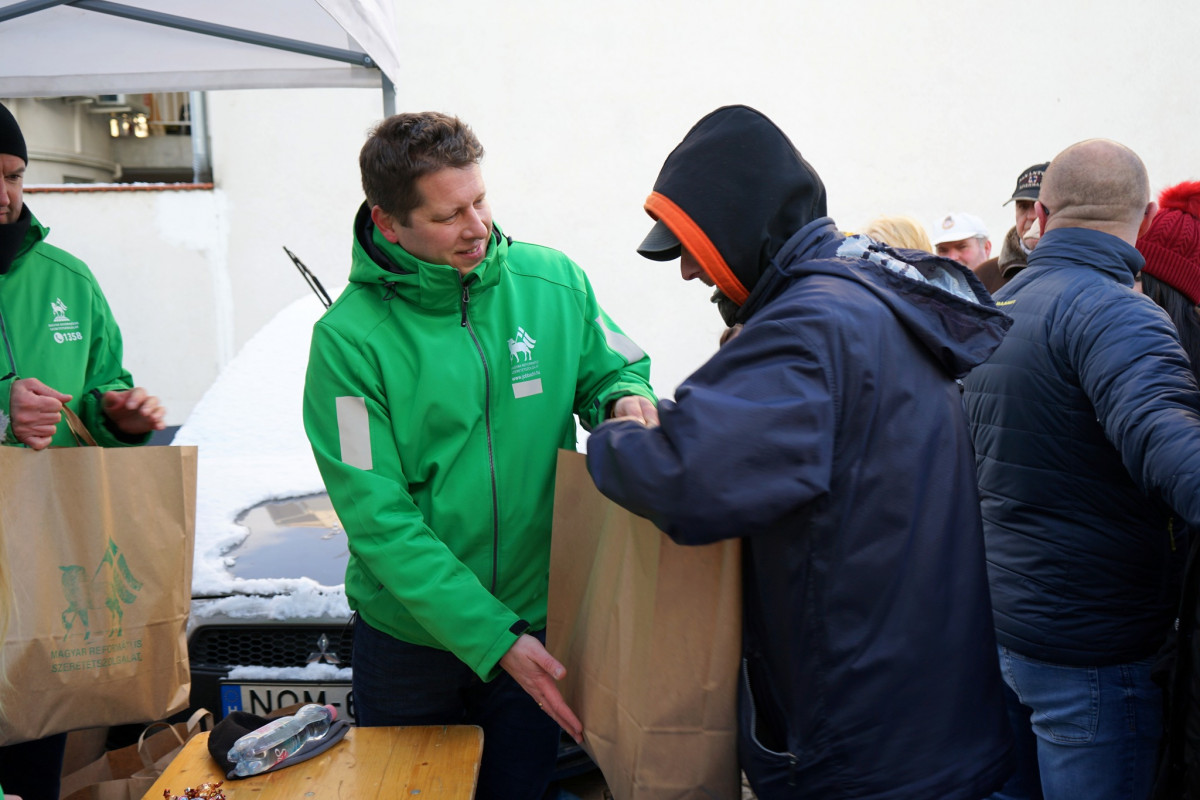We experienced firsthand in Debrecen at the donation distribution of the Hungarian Reformed Church Aid that there is a huge need for help. On December 12, 150 people came to the courtyard of the Leány utca headquarters, and the packages were given in a short time. At Christmas time, the desire to donate typically increases in Hungary.
But who is considered needy these days? How does the organization, which now operates with nearly 1,000 volunteers and generates billions of forints annually, help? We asked Márton Juhász, director of the Hungarian Reformed Charity Service, about this and much more.
According to what criteria do you distribute donations? Can you get a list of those in need?
The system works nationally in such a way that social specialists and employees are constantly in contact with the needy throughout the year. Distributions are organized in response to requests for donations. When a larger number of people get together, we usually organize a public distribution. Our specialized employees decide who can be included in the group of beneficiaries based on a system of criteria.
Can anyone just knock on your door? Does it matter if the person in need is religious?
We do not only help Reformed people, nor only Christians. We have customer reception hours, but donation requests can be submitted online and by mail. There are cases when someone comes to us with a pastor’s recommendation, this is especially important in smaller settlements, because everyone in the villages knows everyone, and they know if a person with a real need has approached us. If no such recommendation is received, we will check the reality of the need.
Who is considered needy in Hungary today?
We typically support low-income people, large families, the elderly, and the disabled. At the most recent donation distribution in Debrecen, for example, we helped those in need who are typically over 70 years old or with visible disabilities.
We also saw that not everyone could handle the package. Haven’t you thought about delivery yet?
If the person in need specifically requests it, we will deliver the donation, but in many cases, logistics make it difficult. You have to arrange with him to be at home, and current fuel prices can make delivery extremely expensive. What we should spend on fuel is instead spent on luggage.
Do the contents of the packages come together from offers or based on your decisions?
So-so. We have organized collections in several stores, and our volunteers are present in several stores during Advent. Similarly, non-perishable food collections take place at churches, schools and companies. We distributed seven thousand 30x30x30 cm boxes across the country, and it seems that they will all be full. We collect monetary donations on the donation line 1358, and payment by bank card is also possible on the adomany.jobbadni.hu website. From the money received, we decide what to buy in the package. As part of our current large collection, the Felabarat program, which runs from mid-October to mid-April, we give bank cards to a hundred needy people, to whom we regularly transfer a certain amount from the received grants. We invented this method during Covid. With this, we can also stimulate the local economy, since these needy people typically spend the money donated in small village shops. We also make the needy come of age, we make them believe that they know what they need.
Can you make sure that the money is not spent on alcohol?
We try to pay attention to this, which is why social specialists work together with our beneficiaries. In appropriate cases, they may even know the needy for years, so they have information about what the funds are used for. This is resolved with donation cards used during the ‘Felebarát’ program since the bank card itself is limited in what it can be used for, so for example, the amount cannot be used for alcohol, tobacco products, or gambling, only for food, medicine or paying bills.
Do you cooperate with other organizations so that there are no overlaps?
Due to the GDPR, we cannot store the data of those in need, but we receive feedback on small settlements if someone goes through all the aid organizations. In this case, it is obviously behind us, but we cannot completely filter out such things.
Has the number of people in need increased in recent years?
It is a difficult question because it is not easy to determine who belongs to this category. You can see that the gap between the richest and the poorest is opening. This is a civilizational disease of humanity, and in our country, it can be seen that the middle class is not sufficiently strengthened.
Are you already feeling the effect of the overhead increase?
Yes, it was already seen in October that the number of people asking for donations had increased significantly. The saddest thing is when a donor (for example, a small pensioner) later becomes a needy person.
You regularly alerted donors not to give low-quality donations to the needy. Is there already an improvement in this?
We are constantly educating our supporters, but in Hungary, not everyone has the right culture of donating yet. For example, we receive a lot of donated clothes that are not worthy to be passed on. We should give clothes and food that we ourselves would like to wear or eat in a given life situation.
What about refugees from Ukraine?
We welcome them in Záhony and Budapest, in the BOK Hall. Over the past 10 months, we have served a total of 182,000 people, but fortunately, they are arriving in much smaller numbers now. Of course, this depends on the intensity of the fights. Life in Transcarpathia is now being made very difficult by the fact that there is no electricity, and it is also uncertain when, in principle, it would be. We also started a short collection under the name Star of Bethlehem in order to bring a little light to the lives of the people there for Christmas. We are looking for candles, lamps, battery lamps, and solar lamps.
What is the budget of the organization?
This changes every year, we are on a huge roller coaster. This year, for example, exactly on February 24 (the day the war broke out), our board of trustees adopted our HUF 4.5 billion budget (this includes the wages of our 1,300 public employees, who help our work at 400 locations), and there are several EU programs that only flows through the organization, so within seconds, he raised the budget to HUF 7.5 billion. Every year is uncertain, but this was our most stable year since the registration of the loving service in 2007. This year was the first year when, in connection with an operating grant, I already knew at this time last year that we would be able to pay the employees in December this year as well.
They say that those who spend a lot of time with the needy get a hard heart…
I experience this less myself, because I work a lot at the conference table, organize and manage, and am rarely in the field. I am more fulfilled when I see first-hand that the donations reach the needy. It gives me a good feeling to see: that’s why I worked, spent the night, and fought. My colleagues who spend their working hours in the field have a much harder time. It is a difficult matter how to encourage them, but unlike a secular organization, we are also motivated by divine love from within, and thanks to this, we are perhaps less threatened by burnout. We try to prevent this, we recommend that they not take their work home and get enough rest. It is also important that they have to accept if they cannot change something.
How do you relate to the general refugee situation?
The principle of local assistance is the most important, but we also try to help those who are already here. The loving service has mission activities, they were not only active during the 2015 refugee crisis, but also before. If someone comes here, we help them learn Hungarian culture, integrate, send their children to school, and get a job, not support themselves on welfare. In many cases, this finds great openness among refugees. We also have former refugee colleagues in the charity service.
Isn’t it sometimes counterintuitive that some companies play the role of a donor as a marketing ploy?
It’s twofold. There was a time when I had to stand in front of the camera for the third time in a week in connection with a lecture, and I was really tired of it. But my assistant convinced me that it is really important to let our supporters know that their donation has gone to the right place. On the other hand, we are also setting an example. I would like to note that many companies donate anonymously, and they agree that they do not want us to publish their names even in a Facebook post. By the way, the majority are like this, and very few people like to flash it. The culture of this has not yet developed in Hungary. Social responsibility is at a higher level in the West.
Debreceni Nap / Sándor N. Nagy, Szabolcs Szilágyi

















